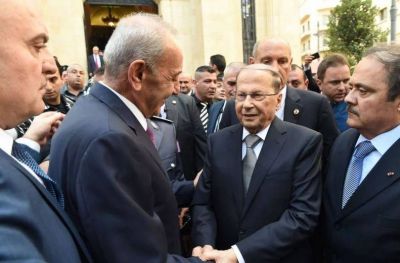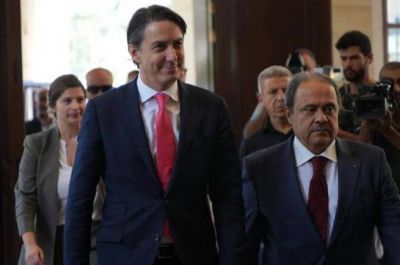US envoy Amos Hochstein arriving in Ain al-Tinah for talks with legislative leader Nabih Berri, Sept. 9, 2022. (Credit: Mohammad Yassin/L'Orient Today)
All bets are off. Lebanon and Israel received early Tuesday morning the final proposal to settle their dispute over the delineation of their maritime border.
While the Israeli media quickly confirmed the “receipt of a modified version of the draft agreement to which the Lebanese authorities have made amendments,” in Beirut, there was talk, until late in the evening, of a version that was “still not final,” which was to be received “in a few hours.”
Ambiguity predominated over the contacts as they entered their final stretch, and the final details that are being discussed are mostly related to the wording and not the essence of the agreement.
Finally, it was shortly after midnight on Tuesday when there was confirmation: Deputy Parliament Speaker Elias Bou Saab, charged by President Michel Aoun to monitor the negotiations, had indeed received the final draft of the agreement.
Initial reports indicated that the last contentious points have been resolved.
It is in a race against time that the American mediator, Amos Hochstein, was engaged to bridge the gaps and reach a final version acceptable to both parties.
Since Tel Aviv announced on Oct. 6 that it rejected the Lebanese amendments to the text, Hochstein has intensified his contacts with officials from both sides in a bid to get the agreement back on track.
After a telephone conversation between Aoun and Hochstein on Sunday evening, the Baabda Palace issued a statement saying, “Discussions have been completed, remarks have been made, and the final version of the draft agreement will be sent in the coming hours” to both parties.
“The Lebanese side will study carefully” the text in order to take “an appropriate decision,” according to the presidency’s statement on Twitter.
For the Americans, however, the negotiations are over, according to a well-informed source who spoke to L’Orient-Le Jour in the evening of Oct. 10.
Hochstein will wait for the response of Lebanon and Israel to this final proposal, the source said, believing that the two countries are very close to an agreement.
Earlier in the day, a State Department official told the Al Arabiya channel that the US mediator “is in contact with all parties and is working to resolve the remaining outstanding differences as the negotiations are in their final phase.”
“We remain committed to reaching a solution and believe that a long-term agreement is possible and within reach,” the US official said.
This sense of optimism is shared by the Lebanese president who said yesterday that “indirect negotiations with Israel have already come a long way” and the “gaps are narrowing” between the positions of the two countries.
Lebanon is preparing to finalize in the coming days “all the arrangements” related to the maritime negotiations, according to Aoun.
Another Lebanese source closely following the negotiations told L’Orient-Le Jour that the agreement could be signed “within the next 10 days.”
The modified version
But what has changed in the space of a few days?
Last Thursday, Israel announced its categorical refusal of the amendments requested by the Lebanese side, going so far as to declare a state of alert at the border.
On Sunday, the company Energean began pumping gas to its floating production facility in the offshore Karish gas field, as part of the reverse flow test procedures approved by the Israeli government.
Hezbollah has repeatedly threatened to strike the site if Israel begins extraction operations before Lebanon can do the same in its Exclusive Economic Zone (EEZ).
“If Hezbollah does anything wrong or attacks Israel in any way, we will destroy Lebanon,” Defense Minister Benny Gantz threatened a few hours earlier.
In its amendments, Beirut refused to recognize the “line of buoys,” while Israel demanded that the agreement take this line into account, which it considered being of strategic importance.
The “line of buoys” — established by Israel after its withdrawal from southern Lebanon in 2000 — extends over six kilometers before joining Line 23, which is claimed by Lebanon.
According to Israeli media, Lebanon asked to amend the text referring to this line by using the term “de facto” instead of “status quo.”
Another point rejected by Israel was the Lebanese request that the text should not mention the “financial compensation” granted to the Israeli side for the part of the Qana gas field that extends southwards beyond the area bordered by Line 23.
It is planned that one of the companies in the consortium in charge of the exploration and exploitation of offshore hydrocarbons in Lebanon’s EEZ, in principle the French giant TotalEnergies, will act as an intermediary by paying the Israeli side a lump sum.
The stakes were high. As the legislative elections are fast approaching, Israeli Prime Minister Yair Lapid was accused by his rival, Benjamin Netanyahu, of having “completely folded in the face of Hassan Nasrallah’s threat.” This prompted Hochstein to double his efforts.
Over the weekend, intensive contacts were made between the Lebanese side, notably Bou Saab, and the team of American negotiators led by Hochstein.
“Lebanon felt a serious American desire to close this file, whether before or after the Israeli legislative elections, regardless of the results of the election,” a well-informed source said.
According to a political source close to the negotiations who spoke with L’Orient-Le Jour, the modified version of Hochstein’s final proposal addresses the two contentious amendments as follows: During the negotiations, the Israelis insisted on considering “the line of buoys” as part of the maritime border separating the two countries, while the Lebanese did not want the text to mention any financial compensation for the Qana gas field.
This implies that the starting point of the line should be point 31 and not point B1, from which Lebanon has drawn Line 23, its official claim. Lebanon has completely rejected this proposal, particularly because it could affect the delineation of the land border.
It was then proposed that the area between the buoy line and line 23 be declared a safe zone, but under Lebanese sovereignty since it belongs to the Lebanese EEZ.
Faced with the Israeli refusal, Hochstein proposed that this area be supervised by the United Nations, but this time it was Hezbollah that opposed it because it is against the expansion of the mandate of the United Nations Interim Force in Lebanon (UNIFIL).
In its amendments, Lebanon removed the clause related to the safe zone from the text. Lapid totally rejected this option, again raising the security issue.
The American mediator exerted pressure on Israel and his contacts have resulted in the following formula: To leave this zone, which does not exceed a few kilometers, suspended until the time comes for the discussion of the land border demarcation.
In the meantime, Lebanon does not consider the area an Israeli border and insists that it be under its sovereignty.
According to sources following the dossier, this area will be called a “free zone of separation,” which needs logistical arrangements to ensure stability, as well as exploration and extraction operations.
The new proposal provides for a linguistic substitution to refer to this zone as a free zone and no longer as a safe zone. The phrase referring to security arrangements will be replaced by logistical arrangements.
The agreement also stipulates that both parties begin work on exploration or extraction, regardless of the identity of this area.
Lebanon has also confirmed that it has nothing to do with the issue of compensation and does not want any reference to this point in the agreement that will be submitted to the UN. This comes as part of relations between Israel and TotalEnergies, who have already begun discussions on this subject. Lebanon is also demanding that TotalEnergies be allowed to explore without taking permission from Israel.
This article was originally published in French in L'Orient-Le Jour. Translation by Sahar Ghoussoub.

